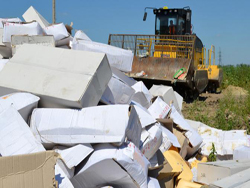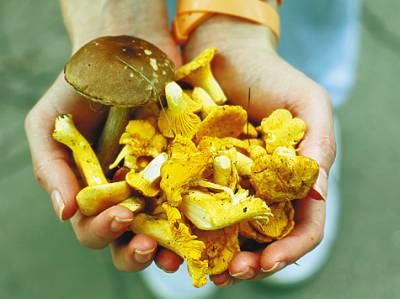
In the Rostov region continues periodic destruction of detained by customs or police parties, “sanctions” products. Perhaps, among the areas where there is a “punitive operation” against mushrooms, tomatoes, bacon and other eatables, Rostov region is one of the leading. This is primarily due to its border position, as well as the fact that Rostov-on-don — one of the major trade hubs in Southern Russia.
Tomatoes and salads “fertilize” the land of the Rostov landfill
At the end of last week in the Aksai district of the Rostov region at the 1061-kilometer Federal highway M-4 “don” the don police officers and representatives of the Rosselkhoznadzor detained a truck carrying vegetables and fruit from the States, in which the Russian government imposed economic sanctions. In the truck officers found more than 2 tons of tomatoes, 152 kg of lettuce and 2 tons of pears of Czech origin, and more than 9 tons of Turkish tomatoes. As a result of the Rosselkhoznadzor inspectors examination, it was found that Turkish tomatoes are infected and pose a risk to the consumer. As for Czech food, Czech Republic are economic sanctions, therefore, pears, tomatoes and lettuce it was also decided to withdraw.
Confiscated fruit and vegetables under the supervision of police delivered to solid waste landfill company “Clean city”, engaged in the cleaning of Rostov-on-don and disposal of garbage. There sanction products from the Czech Republic with a weight of 4.2 tons and from Turkey weighing 9 tons were destroyed. The tractor smashed vegetables and fruits, rolled them in the ground, mixing with the dirt.
The sad fate of the Polish mushrooms
This is not the first operation to destroy the sanctions of products. March 15, in the proletarian district of Rostov-on-don the police stopped the truck carrying the tomatoes and mushrooms. Documents for the cargo the driver to present a failed, but police managed to establish that the products are of Polish origin. More than 14 tons of tomatoes and mushrooms from Poland, as a result, were delivered to the landfill and destroyed crawler tractor. A week earlier were destroyed about 18 tonnes of Polish mushrooms that were discovered in the truck on the territory of one of food bases of Rostov-on-don.
Even more ambitious operation against sanctions mushrooms of Polish origin took place at the end of 2015. In Chertkovsky area of the Rostov region stopped the truck, carrying paper plates. However, under the utensils was a large amount of mushrooms — about 14.2 tons of mushrooms of unknown origin. Police found that the goods brought from Poland. As a result, products were seized and destroyed at the landfill in Millerovo. Another large shipment of mushrooms from Poland was arrested on the same day the Rostov-on-don. The following day, over 16.6 million tons of Polish mushrooms were destroyed at the landfill of solid domestic waste.
What to do with prohibited products?
Sanctions destroying the products, the authorities show their seriousness. Russian businessmen must understand that it is pointless to purchase products from countries subject to economic sanctions. In any case, if this product is found, it will destroy. However, the population of the country in General and the Rostov region, in particular, the mass destruction sanctions products raises many questions. There are people who unconditionally support the decision of the Russian government, but many wonder whether the seized goods are not to destroy, but to direct it in a more reasonable goal?
The indignation of some of the citizens sanction the destruction of products is quite understandable. The prices for food in Russia and in the Rostov region, in particular, the very “biting”. After the imposition of sanctions against Poland, which had banned imports of mushrooms from that country, the price of mushrooms has soared by almost two times. Many people, especially with medium and low earnings, had to translate mushroom dishes in the category of holiday. High prices for tomatoes.
Therefore, periodically there are a variety of proposals about what to do with prohibited goods, not vetiva them in the dirt at the landfill. After checking on the safety of use in writing their offer to distribute to the poor categories of the population — pensioners, invalids, unemployed. Sound ideas to put the seized products are normal quality in children’s homes, the disabled and the elderly. The Deputy of the State Duma Andrey Krutov offered to send food to Donbass as humanitarian aid. Another sensible suggestion is to send the seized products in Russian detention centres and colonies. After all, there is not too varied and rich in fruit and vegetables “menu”.
Instead of Turkey, you get new partners
The most serious blow to the fruit and vegetable business was caused by the imposition of economic sanctions against Turkey. As is known, 2 December 2015 the Government has published a list of Turkish products prohibited for import to the territory of the country. In the list of prohibited goods included vegetables — tomatoes, onions, shallots, cauliflower, broccoli, cucumbers and gherkins, as well as fruits — oranges, tangerines, grapes, apples, pears, apricots, peaches, plums, strawberries. In addition, Russia has banned the import of meat and chicken breast, salt, fresh carnations. According to senior analyst “Alpari”Anna Bodrova, the share of Turkish goods in the Rostov market was not less than 25%. However, this segment quickly enough will be occupied by products from other countries, in particular from Azerbaijan.
“Free press — South” already wrote that after the deterioration of relations with Turkey, certain problems have arisen in many joint Russian-Turkish ventures. So, products from Turkey stopped flowing on the largest warehouses in the South of Russia the Fruit and vegetable logistics complex “F. O. R. T.”, located in Aksai and was built in 2011 as a joint venture between Russia, Azerbaijan and Turkey. After the events with the Russian aircraft, at the flagpole in F. O. R. T. disappeared Turkish national flag.
Of course, the Russian entrepreneurs who do not wish to have problems with the law, trying to shift to new partners. In particular, fruits and vegetables start to import from Iran, Israel, speak about the need to develop trade with African countries. At the same time, it is possible that a significant portion of fruits and vegetables sold in the Russian markets, still has Turkish, Polish and other “sanctions” origin. Just enterprising sellers find the opportunity to disguise it under the products of the countries for which sanctions have not been imposed. In doing so, they can contribute some dishonest employees of the responsible services.
Citizens are encouraged to report sanctions the sale of goods
At present, sanctions against goods connected almost all agencies and services working in the field of food safety the Rosselkhoznadzor, Rospotrebnadzor, police enforcement and administrative law to combat economic crimes, customs officers and border guards. In September 2015, set up a special mobile group to combat the importation of goods of the sanctions, as reported by the head of the Taganrog customs Igor kaplunovsky. It is clear that customs officers formed the bulk of the work on the identification of smuggling on the territory of the Russian Federation prohibited products.
By the way, not always the staff of the competent authorities to act carefully when confiscate and destroy the goods of the following States, which imposed economic sanctions. So, TASS, citing the press service of the southern customs Department, in September last gadaoba that as a result of the investigative audit conducted at the Krasnodar customs, I found out that customs officials have destroyed 407 kilo sports nutrition. Country of origin was the United States of America. However, as it turned out, sports nutrition is not included in the list of goods the import of which into Russia is prohibited.
In addition to its employees, the concerned and hope to help ordinary “vigilant” citizens. Who, if not ordinary people, know better where and how is trade sanctions of goods. Rospotrebnadzor administration in the Rostov region the Rostov and offers the residents of the region to report on the hotline about the sale of prohibited goods. According to the head of Mikhail Solovyov, the staff will quickly respond to each incoming signal. In case of confirmation messages the CPS will go to court and claim the decision on confiscation or destruction of prohibited products.








